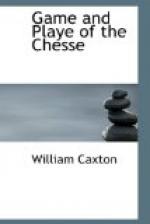And al be it that in that
place square
Of the lystes, I meane the
eschekere,
A man may learn to be wise
and ware;
I that have avanturede many
a yere,
My witte therein is but litelle
the nere,
Save that somewhat I know
a Kynges draught,
Of other draughts lernede
have I naught.”—(p. 77.)
“In those days,” says Warton, “ecclesiastics and schoolmen presumed to dictate to kings and to give rules for administering states, drawn from the narrow circle of speculation, and conceived amid the pedantries of a cloister. It was probably recommended to Occleve’s notice by having been translated into English by John Trevisa, a celebrated translator about the year 1390.[21]
Having thus traced the stream back to its fountain, we return to Caxton. The story of his life has been told by Mr. Blades, and only the most essential facts of his busy and useful career need be recapitulated here. He was born in the Weald of Kent, and it has been conjectured that the manor of Caustons, near Hadlow, was the original home of the family. He was apprenticed to Alderman Robert Large, a mercer, who was afterwards Lord Mayor. The entry in the books of the Mercers’ Company leads to the inference that Caxton was born about 1422. Probably on the death of Large, in 1441, Caxton went abroad, for he tells us that in 1471 he had been resident outside England for thirty years. About 1462 or 1463 he was Governor of the English Nation or Merchant Adventurers at Bruges. This was a position of great influence, and it is thought to have enabled the loyal mercer to give good service to Edward IV., who was an exile in 1470. Caxton’s marriage was not much later than 1469, and it is conjectured that this led him to enter the service of the Duchess of Burgundy. She had literary tastes, and at her request he translated the “Recuyell des Histoires de Troyes” of Raoul Le Fevre. It was the demand for copies of this that exhausted Caxton’s calligraphic patience, and led to his employment of a printer. The incident may have been casual, but it led to great results. It has been said that he learned the printers’ art at Cologne, but Mr. Blades supposes that he entered its mystery at Bruges under Colard Mansion, with whom he appears to have had some partnership. Probably towards the end of 1476 Caxton returned to England. He had the favour of Edward IV. and of his sister, Duchess of Burgundy, and the friendship of the King’s brother-in-law, Earl Rivers. Ninety-nine distinct productions issued from Caxton’s press, he was printer, publisher, translator, and something of author as well. He set in good earnest about the work that is still going on—of making the best accessible literature widely and commonly known. This useful career was only ended by his death. The exact date is not known, but it was probably late in 1491. He left a married daughter. Caxton was a good business man. He was also a sincere lover of literature, and he was at his favourite work of translation only a few hours before the final summons came.




